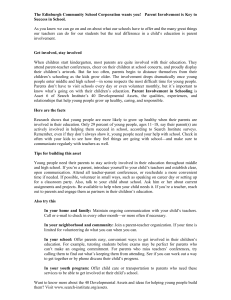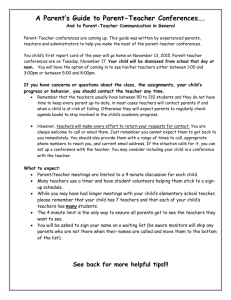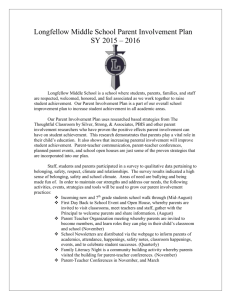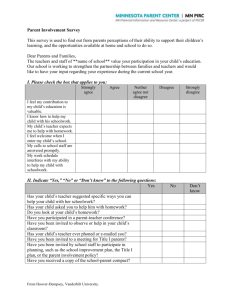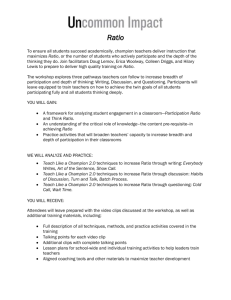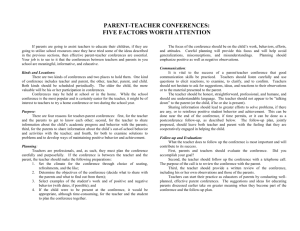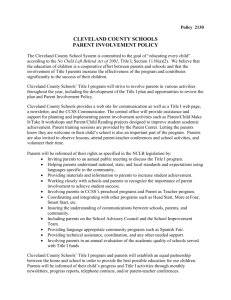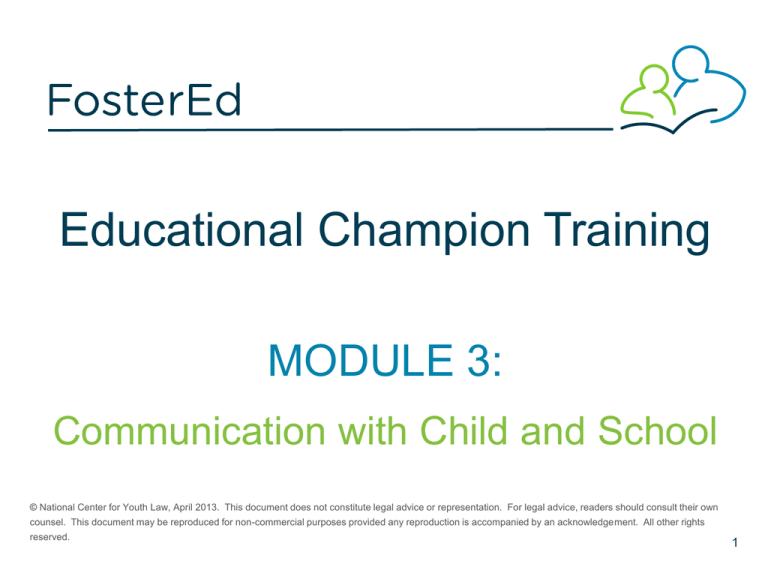
Educational Champion Training
MODULE 3:
Communication with Child and School
© National Center for Youth Law, April 2013. This document does not constitute legal advice or representation. For legal advice, readers should consult their own
counsel. This document may be reproduced for non-commercial purposes provided any reproduction is accompanied by an acknowledgement. All other rights
reserved.
1
Why Focus on Communication?
Communicating with a child about their school experiences is an
important component of supporting their education.
Children whose parents regularly talk with them about school do
better academically than children whose parents rarely discuss
school with them.
Building a positive, communicative relationship with the child’s
teacher(s) and school staff can also help support a child’s school
experience.
APRIL 2013
2
Talk to the child regularly about what is happening
at school.
Talk to the child about how things are going at school and what he/she is
learning.
Here are some sample questions you can use to start the conversation:
What was your favorite thing about school today (or this week)?”
“Can you tell me about three things you learned at school today (or
this week)?”
“Who did you spend time with during recess/lunch today?”
APRIL 2013
3
Talk to the child about his/her schoolwork.
Here are some sample questions or comments to start the
conversation:
“What subjects do you have homework in tonight?”
“Do you have any tests or quizzes coming up?”
“Did you have any tests today (or this week)?”
APRIL 2013
4
Talk to the child about his/her interests and
goals at school.
Here are some ways to start the conversation:
“What subjects do you like the best?”
“What subjects do you think are the hardest? Why are they
hardest?”
“What subjects do you think are the easiest? Why are they
easiest?”
APRIL 2013
5
Strategies you can try if you are having trouble
getting the child interested in talking.
Ask the child to tell you a story about something that
happened in school.
Offer to tell the child something about your own day first;
then ask the child to tell you something about his/her day.
Try talking to the child about school while doing a project or
activity together.
APRIL 2013
6
Always listen to what the child has to say about
school.
This will help you stay aware of how things are going
at school.
It will show the child that you care about his/her
education and value what he/she says about school.
APRIL 2013
7
Say things to encourage the child, and to
encourage problem solving.
Some examples:
“You are doing a great job with your homework!”
“I am very proud of how hard you worked on your
project!”
“I know you are having a hard time in school right now,
but I am here to support you. Let’s talk about what we
can do to make things better.”
APRIL 2013
8
Communicate with your actions as well as with
your words.
Here are some ideas of ways to show the child that you
value his/her work and think school is important:
Keep a folder of the child’s best schoolwork.
If your schedule allows it, consider volunteering in the
child’s classroom or school.
Attend school events in which the child is involved
APRIL 2013
9
How to communicate with the child’s school.
Keep a list of important contact people at the child’s school. The list should
include:
The child’s teacher (or teachers)
The school principal
The school counselor
The County Office of Education foster youth liaison
The school district foster youth education liaison
The district’s special education director
APRIL 2013
10
How to introduce yourself to school staff.
As an ed champion, you should introduce yourself to the child’s
teacher and school staff.
An sample script for ed champions who hold ed rights would be: “I
have been appointed by the Juvenile Court as ____ ed rep. That
means that I make educational decisions for _____in the same
way that his/ her parent would. This includes being in regular
contact with the teacher and participating in school meetings. I
also report on ____ progress to the court. Here is my contact info
and copy of my court order.”
APRIL 2013
11
Talk to the child’s teacher regularly about how
the child is doing in school, even if the child is
doing well.
The child’s teacher will be glad that you are interested
and want to participate in the child’s education!
Here are some sample questions you can ask the
child’s teacher:
“Is ____ keeping up with homework assignments?”
“How is ____’s overall progress?”
“Are there any subjects that _____ is having a hard time
in?”
APRIL 2013
12
Effective Strategies for communication with the
child’s teacher.
Make eye contact;
Listen carefully;
Being open to the teacher’s ideas;
Being proactive in sharing his/her opinions and
ideas.
APRIL 2013
13
Keep communication open!
Make sure to respond to all communications from the child’s teacher
or school staff.
Attend all school meetings. This includes:
Back to school night or school open house night
Teacher conferences
Special education meetings
Any other meetings that the child’s teacher or school staff invite you to
If a meeting is scheduled at a time you can’t attend, be sure to let the
school know and ask to reschedule for a time that works for you.
APRIL 2013
14
Additional thoughts if you don’t hold ed rights.
If you are a child’s ed champion but you do not hold
education rights for the child, reach out to the person
who does to let him/her know that you’re interested in
reviewing the child’s records, speaking with the child’s
teacher, or attending school meetings.
If the education rights holder is the child’s birth parent,
check with the social worker for the best way to do this.
APRIL 2013
15
Be proactive.
If you have questions or concerns about how things are
going at school, don’t be afraid to ask. Call the teacher to
schedule a time to meet in person. Try to write down your
questions or comments ahead of time so they will be
easier to remember at the meeting.
APRIL 2013
16
Consider getting input from other
adults involved in the child’s life.
Especially if the child does not live with you, you may want to
ask other adults in the child’s life for support and feedback in
making education-related decisions.
EXAMPLES:
If you are not the child’s caregiver right now, think about inviting
the child’s caregiver to attend parent-teacher conferences.
You may also want to consider inviting tutors, coaches, or other
adult family members to school meetings.
APRIL 2013
17
My Goals:
What I will do:
How often I will do this:
__________________
___________________
__________________
___________________
__________________
___________________
__________________
___________________
__________________
___________________
__________________
___________________
APRIL 2013
18
Resources.
This PowerPoint, Tip Sheets, Mentoring Modules, and supporting materials can be found at:
www.foster-ed.org.
If you have questions about the materials, please contact: info@fostered.org.
Other Resources:
Communicating with Your Child’s Teacher, written by the University of Florida IFAS Extension
Back-to-School Conference Questions, written by School Family and available at SchoolFamily.com
Parent-Teacher Conferences: A Tip Sheet for Parents, written by Harvard Family Research Project
and available at www.hfrp.org
Effects of Parental Involvement on Eighth-Grade Achievement, by E.H. Sui-Chu and J.D. Willms
APRIL 2013
19


